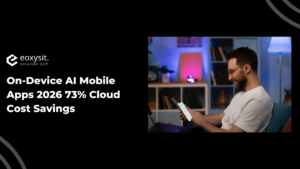Introduction: The Paradigm Shift in AI
Artificial intelligence AI) has become integral to how businesses operate, powering everything from chatbots and personalized recommendations to predictive analytics. However, 2025 marks the dawn of a transformative new AI paradigm: agentic AI. These next-generation systems differ fundamentally from previous approaches and are reshaping the landscape of enterpriseautomation and decision-making.
Agentic AI moves beyond passive automation—where systems act only when programmed or instructed—toward intelligent agents that proactively analyze their environment, set their own intermediate goals, make decisions, and autonomously execute complex tasks. As businesses worldwide race to leverage smarter, more adaptive automation, agentic AI represents a true leap forward in autonomy, efficiency, and innovation.
The Defining Features of Agentic AI
Unlike earlier AI forms that adhered strictly to predefined rules or static models, agentic AI systems are distinguished by several key characteristics:
- Proactivity: Agentic AIs do not wait for commands. They monitor the environment, anticipate needs, and decide when and how to act.
- Goal-Directed Behavior: Given high-level business goals, these agents dynamically break them into actionable steps—altering strategies in response to new data or obstacles.
- Learning and Adaptation: Leveraging reinforcement learning and continual feedback, agentic AI grows smarter through experience.
- Context Awareness: These agents maintain an evolving understanding of context, enabling them to operate effectively in complex, changing environments.
- Multi-Agent Collaboration: In advanced applications, multiple agentic systems coordinate with each other to solve problems collectively.
- This radical increase in autonomy holds significant potential for companies aiming to modernize and scale their operations in a dynamic digital world.
From Traditional Automation to Agentic Intelligence
To understand the novelty of agentic AI, consider the limitations of classic business automation:
- Rule-based bots repeat predefined tasks—such as filling out forms or responding to FAQs —without understanding context or adjusting to new information.
- Workflow automation tools are powerful, but they require rigid process mapping and lack true decision-making abilities.
Agentic AI, by contrast, can navigate uncertainty, resolve ambiguity, and learn new strategies, empowering businesses to automate not just repetitive processes but also higher order decision-making and creative problem-solving.
The Core Technologies Driving Agentic AI
Several groundbreaking technologies are converging to enable agentic AI systems:
1. Reinforcement Learning RL
RL allows agents to learn optimal actions through trial and error, guided by feedback (rewards or penalties) from their environment. This approach gives agentic AIs the ability to discover unexpected solutions and refine their behavior over time.
2. Large Language Models LLMs
Modern LLMs, such as GPT4o and Gemini, provide natural language understanding and reasoning capabilities. When embedded in agentic systems, they power fluent interaction, contextual awareness, and autonomous planning.
3. Multi-Modal AI
The latest agentic agents combine insights from text, images, audio, and even sensor data— enabling them to operate across diverse digital and physical domains.
4. Autonomous Workflow Orchestration
Agentic AI leverages sophisticated orchestration engines to manage multiple tasks and sub processes, monitor resource allocation, and handle dependencies or exceptions.
5. Cloud and Edge AI Infrastructure
Cloud platforms supply the compute power for large, adaptive agents, while advances in on device (edge) AI allow agentic systems to function closer to real-world operations—reducing latency and improving responsiveness.

Real-World Applications of Agentic AI in Business
1. Customer Service and Support
Agentic AI is revolutionizing customer engagement by powering virtual assistants that:
- Handle complex multi-turn conversations
- Anticipate related customer needs
- Proactively onboard, upsell, or resolve issues
- Escalate intelligently to human agents when needed
2. Operations and Resource Management
Agentic systems autonomously optimize workflows in logistics, inventory, and workforce scheduling by:
- Monitoring KPIs and thresholds in real time
- Making dynamic adjustments (e.g., re-routing shipments due to delays)
- Delegating and prioritizing tasks across departments
3. Business Intelligence and Analytics
Traditional dashboards show “what happened,” but agentic AI can:
- Discover patterns in massive datasets
- Generate actionable recommendations
- Trigger automated experiments or targeted campaigns
4. Personalized Digital Experiences
Agentic AI enables companies to craft adaptive user journeys by:
- Continuously learning user preferences
- Orchestrating content, offers, or interface changes in real time
5. Industry-Specific Use Cases
Healthcare: Intelligent agents assist with triage, patient monitoring, and care coordination.
Finance: Agentic AI automates portfolio management and fraud detection workflows.
Manufacturing: Smart agents optimize production lines, maintenance, and supply chain logistics.

The Business Impact: Benefits and ROI
Companies adopting agentic AI have reported:
- Increased Efficiency: Autonomous agents free up human talent, reduce manual bottlenecks, and accelerate decision cycles.
- Higher Accuracy: By learning from data and feedback loops, agentic systems continually improve performance.
- Scalability: Agentic AI handles rising complexity across business functions without linear increases in cost.
- Innovation: Freed from repetitive tasks, human teams focus on strategic and creative work, driving new value.
Challenges and Limitations
While the promise is great, implementing agentic AI presents real challenges:
1. Complexity of System Design
Orchestrating autonomous agents in dynamic, multi-factor environments requires robust architecture and continuous optimization.
2. Data Quality and Security
Agents learn from the data they receive. Inaccurate, incomplete, or biased datasets can generate suboptimal actions; securing sensitive business data remains paramount.
3. Explainability and Transparency
As agentic decisions become more complex, businesses must ensure that agentic AI offers transparent reasoning and auditability—especially in regulated sectors.
4. Ethics and Governance
Proactive systems raise ethical questions around bias, autonomy, and the boundaries of automated decision-making. Building responsible agentic AI requires rigorous oversight and governance frameworks.
5. Human Collaboration
Agentic AI should complement, not replace, human skills. The best results come from transparent partnership, where humans retain overall control and agents serve as force multipliers.
Future Directions: What’s Next for Agentic AI?
Industry experts expect explosive growth in agentic AI applications between 2025 and 2030, especially as businesses embrace hybrid cloud, IoT, and advanced automation. Emerging trends include:
- Multi-Agent Ecosystems: Swarms of intercommunicating agents collaborating to solve large-scale, cross-functional problems—far beyond isolated bots or assistants.
- Self-Improving Enterprises: Agentic AI will not only automate but also monitor and recalibrate entire business systems for continuous improvement.
- Regulatory and Ethical Frameworks: Expect new standards, tools, and best practices for explainable, safe, and fair autonomous systems.
- Industry-Specific Specialization: Custom agentic solutions tailored for health, finance, supply chain, and beyond—optimizing for unique data landscapes and compliance demands.
Getting Started: Leveraging Agentic AI for Your Business
For organizations ready to embrace this next wave, a successful agentic AI journey involves:
- Identifying High-Impact Use Cases: Start with business challenges that benefit most from automation and adaptive intelligence.
- Building a Strong Data Foundation: High-quality, relevant, and secure data is the backbone of effective agentic AI.
- Collaborating With Experts: Engage with AI technology partners who understand both the technical and business dimensions of agentic systems.
- Piloting and Scaling Responsibly: Begin with controlled trials, monitor results, and iterate— prioritizing transparency, ethics, and organizational learning.
- Empowering Employees: Balance automation with upskilling your team to work creatively alongside AI agents.
Note: Eoxys IT Solution LLP offers consultation, design, and implementation services for businesses seeking to harness cutting-edge agentic AI in digital transformation projects. Our expert team can help you identify opportunities, architect solutions, and deploy agentic systems tailored to your needs.
Conclusion: The Agentic Future Has Arrived
Agentic AI represents an inflection point in enterprise technology—one where automation is no longer static but proactive, dynamic, and truly intelligent. Forward-thinking companies that embrace these capabilities will gain a powerful edge in operational efficiency, customer satisfaction, and innovation.
As these systems become more integrated across industries, now is the critical moment to understand, invest in, and responsibly implement agentic AI. By building a strong foundation today, organizations can unlock new heights of productivity and value for years to come.
If youʼre interested in exploring the transformative potential of agentic AI—or seeking expert support in deploying these advanced systems—consider reaching out to trusted partners with proven experience in intelligent automation. The business revolution is just getting started, and with agentic AI, the possibilities are as limitless as your ambition.






